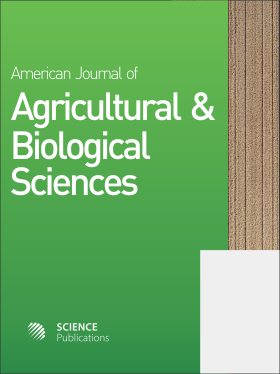Study on Nitrogen Concentration of Corn Hybrids
- 1 Department of Plant Science, South Dakota State University, Brookings, SD 57007, United Kingdom
- 2 Pannar Seed Inc., 40329 US Highway 14 East, Huron, SD 57350, United States
- 3 Department of Plant Science, South Dakota State University, Brookings, SD 57007, United States
Abstract
Problem statement: Though Nitrogen (N) is vital in different physiological and developmental processes in plants and animals, it poses several environmental, nutritional and health problems, if present in excess amounts. Reduction in excess input of N into the soil, thereby reducing environmental problems and consequently nutritional and health problems, can be achieved by balancing their concentration in animal feed. Therefore, this research aims to quantify the N concentrations in commercially adapted corn hybrids in South Dakota and to determine if selection can be carried out for this trait to develop useful inbred lines; to determine the effect of planting densities on N concentrations and Dry Matter (DM) yields. Approach: Ten hybrids were planted in randomized complete block design with three replications and two population densities at three different locations in South Dakota. Whole plants sampled at silage harvesting stage were analyzed for N and nitrate concentration and dry matter yield. Results: Hybrid differences based on pooled variance for percent nitrogen were significant. There was no difference in mean N concentration between two planting populations. DM yields were highly dependent on hybrids’ genetics but were altered by environments. Hybrids 2D601, N67-T4, N70-T9 and DKC54-51 were the better in terms of overall performance. On an average, they had N, nitrate concentrations and N uptake on lower range; DM yield and plant stand percentage in the higher range. Hybrids 35y54, LG2489Bt and 34n43 were on the higher range of N and nitrate concentrations and N uptake, variable in DM yields, basically towards lower range. Conclusion: Our results show that hybrids are genetically variable in terms of N concentration. Therefore, it is possible to carryout selection based on these parameters. However, effect of environments should be considered while establishing a selection program. Further, selection based on N concentration can be carried out without giving up DM yields. It is suggested to include more and diversified germplasm for further study.
DOI: https://doi.org/10.3844/ajabssp.2011.148.154

- 4,761 Views
- 4,575 Downloads
- 3 Citations
Download
Keywords
- Nitrogen Concentration
- Corn Hybrids
- Dry Matter Yield
- Nitrate Concentration
